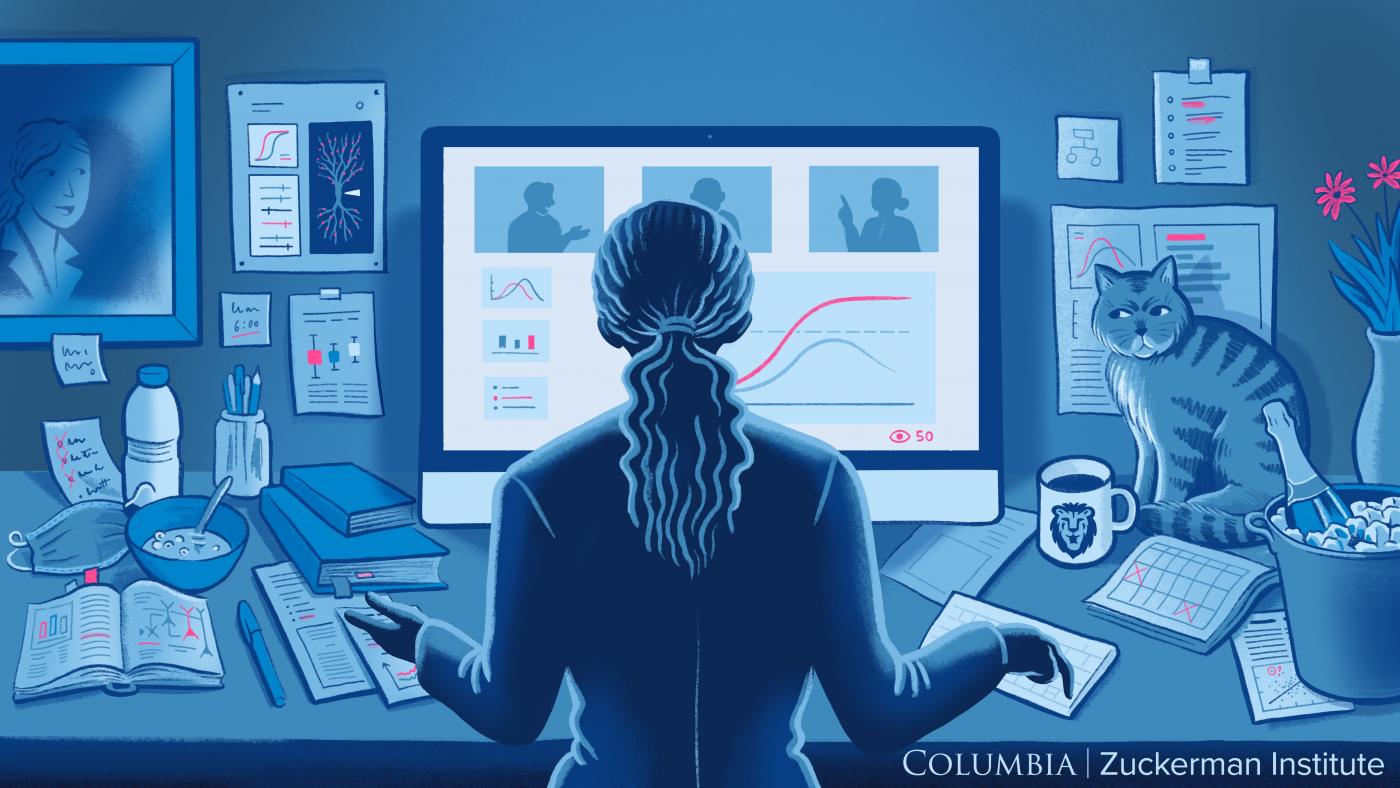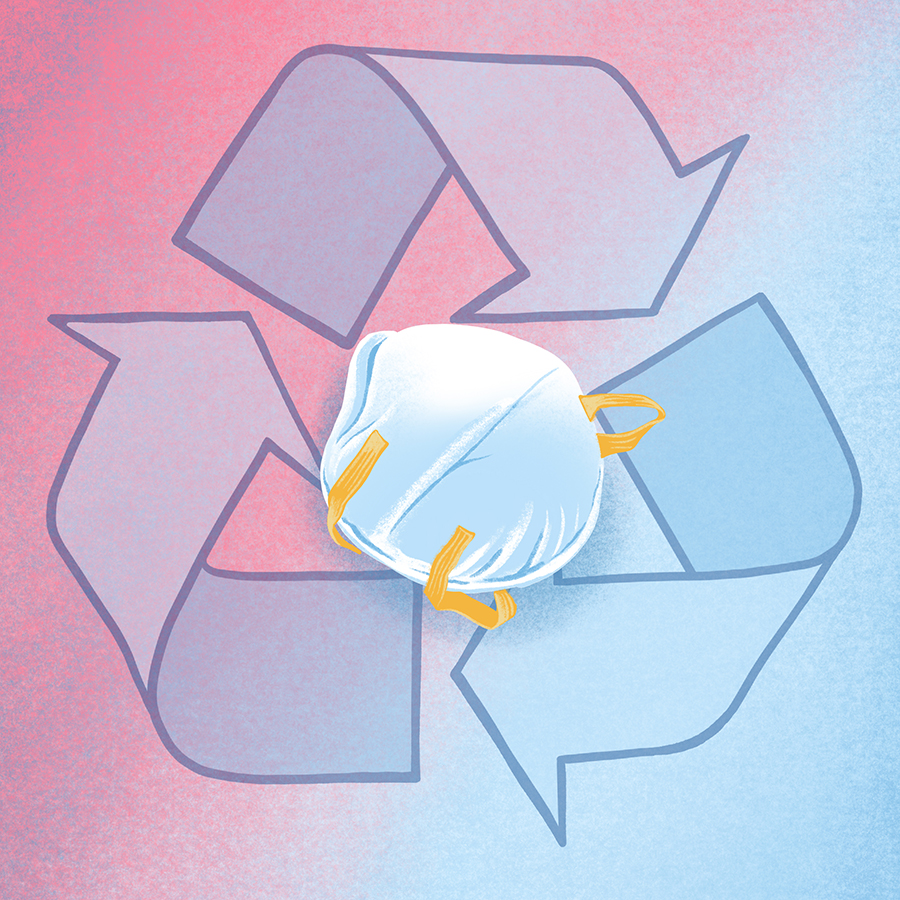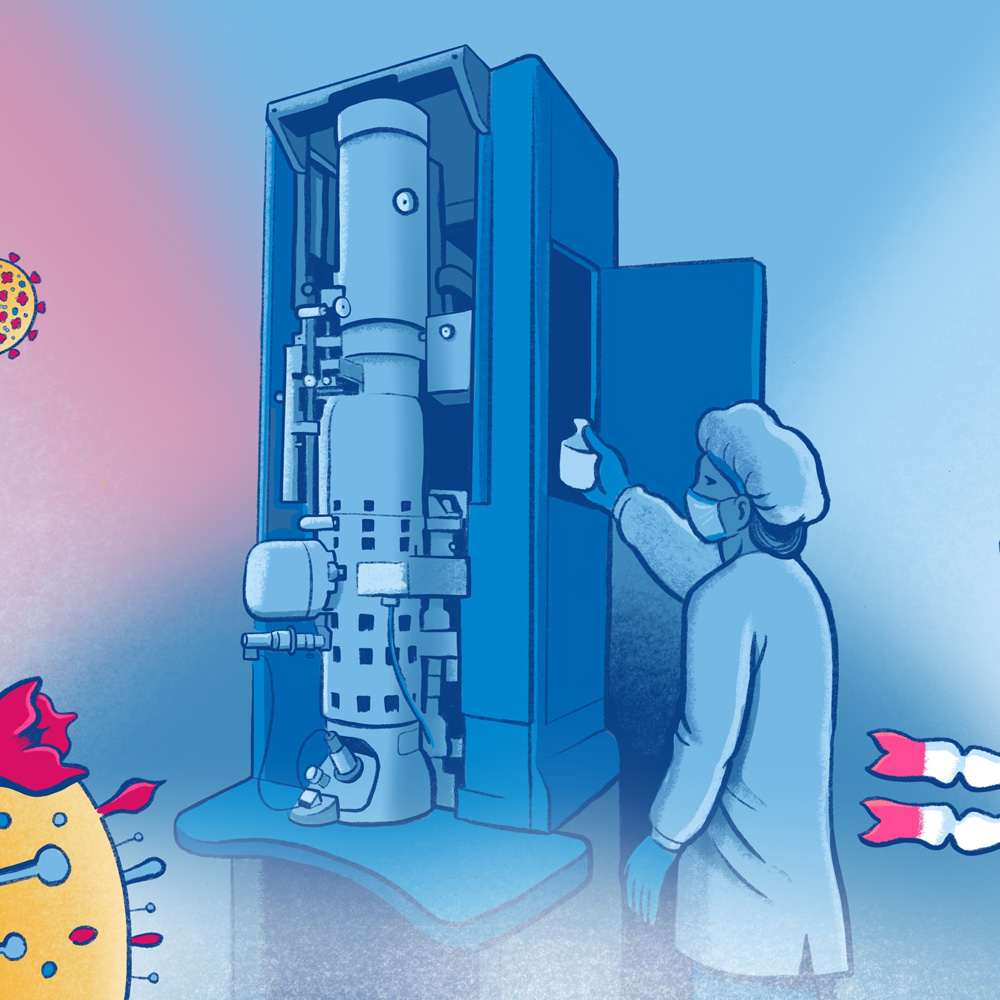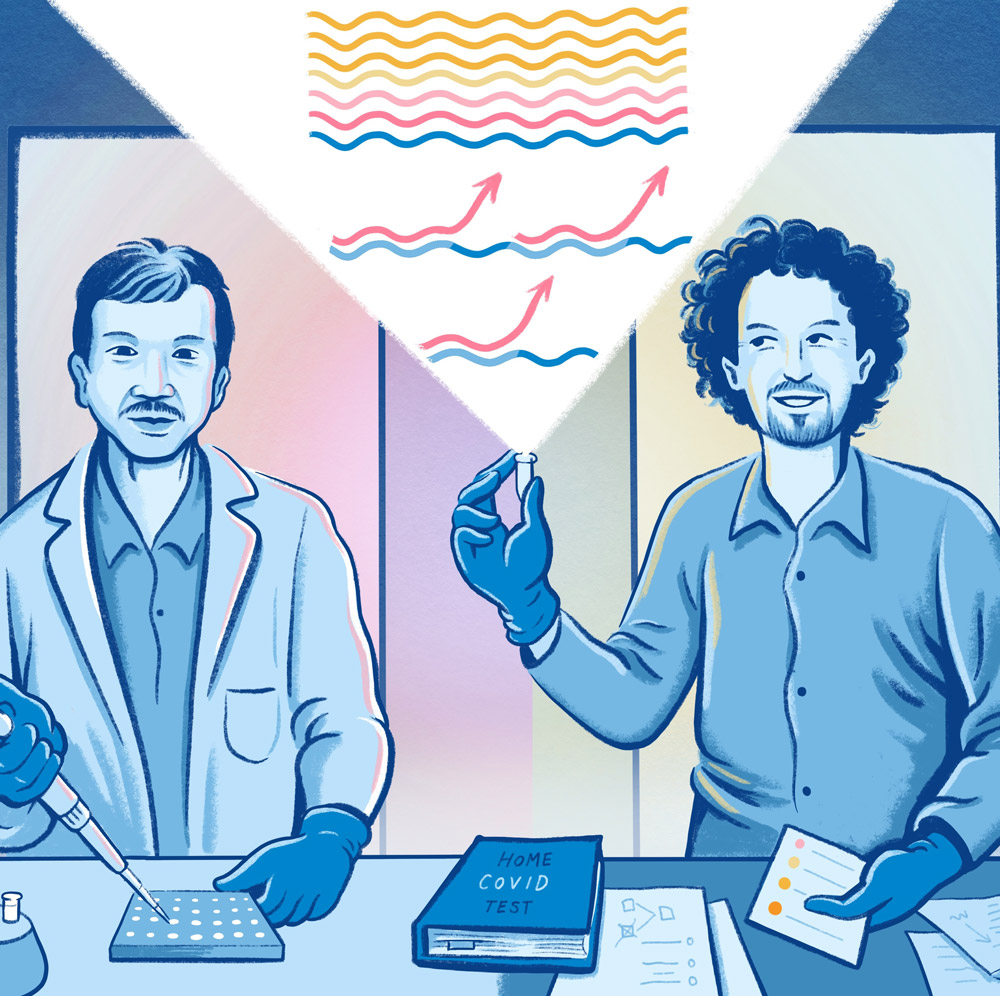KATHLEEN I’m Kathleen Durkin of Columbia University’s Zuckerman Institute.
DEVIN And I’m Devin Powell of the Zuckerman Institute.
KATHLEEN Welcome to Lab in the Time of Coronavirus, a podcast that follows the lives of brain scientists during the ongoing pandemic.
DEVIN For months, we’ve been telling the stories of researchers who are pivoting to work on COVID-19.
KATHLEEN But today we’re going to explore the pandemic’s impact on the researchers themselves.
DEVIN Specifically, we’re talking to PhD students who finished up their degrees during the public health crisis. So imagine: You’ve spent years of your life doing experiments and analyzing data in the hopes of contributing some new knowledge to the world.
KATHLEEN You’re almost done. You’re preparing to defend your written thesis to a public crowd and to your committee of professors. It’s a big deal. And then COVID breaks out. And you’re suddenly presenting your thesis on Zoom.
ELLEN Everything was planned, people were flying in. It was right when the university was really figuring out what the rules were going to be.
KATHLEEN That’s Ellen Tedeschi, a former PhD student in the lab of Daphna Shohamy at the Zuckerman Institute, who studied how curiosity affects our memories.
ELLEN It went from okay, you can have a public defense but it can only be 20 people in the room; we can just pick who to invite, that’s fine. And then it was you can have a defense but it can only be the committee in the room. And then like two days later it was nobody in the room. So it was this crazy process.
KATHLEEN During those early COVID days, Ellen eventually learned that she would be presenting her research on Zoom. It was a relief.
ELLEN Once it switched to online it was oh, okay, at least now everybody gets to see it. We did some lab practices which we do normally in person but we did them over Zoom, and that was really helpful.
DEVIN While practicing, she realized that she would need to make some adjustments to defend her thesis from a laptop in her living room.
ELLEN One of the challenges during the practices was figuring out what the setup was going to be, because I wanted to be able to see my notes and the slides and the audience. I can’t give a good talk if I don’t feel like there’s an audience. I ordered adapters and connectors and found another monitor. I connected it so that I was reading my laptop but I could see everybody on the screen behind it.
KATHLEEN As Ellen was preparing for her talk, Veronica Birdsall was squeezing in one last experiment for her work on proteins and neurodegenerative disorders with Clarissa Waites, faculty in the department of neuroscience.
VERONICA My last day in the lab was mid-March sometime, and I just barely managed to finish the last experiment that I truly needed to do to finish up and defend, which was so, so lucky.
DEVIN Veronica moved back in with her parents in Connecticut to write up her PhD research.
VERONICA They didn’t have a ton of extra space. I was mostly working in my childhood bedroom which is on the second floor, writing my thesis in there, and of course it’s bright blue and there’s a huge Orlando Bloom poster.
KATHLEEN She decided that Orlando Bloom might not make the best background for her actual presentation. Also, the internet in her childhood bedroom wasn’t that great. So she set up her computer in the basement.
VERONICA I was nightmarishly concerned about the Wi-Fi dropping out when I was trying to give my defense. I did do the defense in the basement to be close to router. It was incredibly bizarre. When you’re in graduate school, you think about your thesis defense as the light at the end of the tunnel for the entire five to seven years that you’re doing your PhD. Obviously, having it remotely was much more anticlimactic. You have to let go of this mental image that you’ve been having and subconscious planning that you’ve been doing for years and years about the day. But then you remind yourself that the most important thing is that you actually defend and graduate.
DEVIN With so many scientists working from home, online thesis defenses have become the new norm. This has caused some technical challenges, as Laura Long told us.
LAURA So I’m in a studio apartment with my husband. He logged on to try to watch my presentation from the other side of the room, and it kicked me off.
KATHLEEN Laura was presenting her research on how the brain understands language, done in Nima Mesgarani’s lab at the Zuckerman Institute.
LAURA Everybody is coming into the Zoom call, and all of a sudden I have to restart my computer. So another friend of mine who’s in my year in the graduate program was telling everybody, “She’s rebooting, she’ll be right back.” And so I was five minutes late to my own defense because of that.
DEVIN Her husband John jumped in here to tell us that more research might be needed to prove that he was the one responsible.
JOHN I would say that is a hypothesis, was not proven, and I’m not sure we could replicate it.
KATHLEEN Laura ran into another technical issue after she finished up the public portion of her presentation and prepared to move on to the private Q&A session, meant to be limited to her and three professors.
LAURA It was funny because they still had it all on the same Zoom call, and they had to ask everybody to leave so that they could have a private defense. My brother was still there. He had walked away, and it was on his iPad, and somebody eventually figured out the right settings to kick him off.
DEVIN Ali Kaufman of Attila Losonczy’s lab at the Zuckerman Institute also ran into some technical issues, while presenting from her bedroom.
ALI I had set up this standing desk, kind of next to my bed, but I angled the camera so that nobody could see.
KATHLEEN In the middle of her presentation on how animals form mental maps, strange lines popped up on her computer.
ALI Someone was accidentally drawing on my screen. I thought there was a hair on my screen, and I was trying to wipe it off but it wouldn’t go anywhere. And then another line started coming up really slowly, and I was like “Oh no …” I don’t think it was on purpose, I don’t think we were getting Zoom bombed, but that was definitely my thought. I’m pretty sure it was an elderly relative who isn’t used to using Zoom.
If you had told me six months ago that I would’ve defended by thesis over Zoom I would’ve probably had a mental breakdown, but it was totally fine.
DEVIN Despite the hiccup, Ali appreciated having that relative there. One advantage of defending on Zoom, she said, was being able to invite a big crowd.
ALI Around 100 people were there. I invited family who live all over the country who would not be able to come. And I actually think that’s something really cool about the pandemic that I hope lasts: people attending from far away.
KATHLEEN Another plus to being remote? Cookies.
ALI Another thing I really liked was the flexibility of being able to work from home. I did get to bake in the middle of the day which was really good for me. I was missing lab work, I guess, so I wanted to be mixing things up and putting them at a temperature for a while and waiting. I mean science is rewarding, but cookies? Nothing really beats how rewarding cookies are.
DEVIN Veronica also appreciated the space that being home provided.
VERONICA If you had told me six months ago that I would’ve defended my thesis over Zoom I would’ve probably had a mental breakdown, but it was totally fine. I had a lot more time to prepare for it because I wasn’t working in lab concurrently which I would’ve been if the lab wasn’t shut down.
KATHLEEN And Laura said being home lowered her anxiety.
LAURA There’s a lot of stress and buildup and imposter syndrome and all sorts of stuff that goes into a defense, and so to a certain degree knowing that it was going to be virtual took a little bit of pressure off as I was leading up to prepare.
DEVIN A thesis defense usually ends with a party. Though getting together with labmates and friends in person wasn’t possible for the folks we talked to, they found ways to celebrate.
LAURA Our doorbell rang four times when it had rung not at all in the last couple of months, for a delivery of flowers and three different bottles of champagne. That was really cool: from family, friends and actually my new employer as well.
KATHLEEN Champagne was a common theme, Ali told us.
ALI Some people in the lab sent me a bottle of champagne and a plant, which was very cute. I had this plant corner in the lab when we moved to Zuckerman and had more light. So I had this bottle of champagne, and I stood at my same standing desk where I had defended my PhD, and everybody tuned in on Zoom for a party afterward.
DEVIN So what’s next, for the newly-minted doctors we interviewed? Ellen is applying to several positions. Some are academic, some are not.
ELLEN I’m just kind of going to see what comes along. It’ll depend on what schools are trying to do, and a lot of them don’t know what things are going to look like in the fall, so it’s kind of a wait and see kind of thing.
KATHLEEN Ali’s heading to a biotech company.
ALI I’m going to do a post-doc over at Regeneron starting at the end of July.
DEVIN Laura got a job at a foundation.
LAURA I am an assistant scientist with the Simons Collaboration on the Global Brain, which is essentially an arm that funds projects especially aimed at trying to understand neural populations and dynamics.
KATHLEEN And Veronica is going into consulting.
VERONICA I have a job that hasn’t started yet at a boutique life science consulting firm. I feel really lucky to have a job. I think I just got incredibly lucky at every aspect, with my defense, the timing of everything, so I’m really grateful for that.
KATHLEEN Thanks for listening to Lab in the Time of Coronavirus. Take a look at the show notes for links to all of the things we discussed. You can find all of our episodes at zuckermaninstitute.columbia.edu or on iTunes. Take a moment to rate and review us on iTunes. That makes it easier for other people to find us.
DEVIN Special thanks to Rui Costa, Jennifer Farris, Daphna Shohamy, the researchers who sat down with us for this episode, and the entire Zuckerman team. The music was provided, as usual, by Miguel Zenón, Jazz Artist-in-Residence at the Zuckerman Institute. If you have any thoughts or any questions, you can find us on Twitter and Instagram @ZuckermanBrain. But before we go, Kathleen you want to hit them with the question you always ask?
KATHLEEN What is the first thing you plan to do post-pandemic?
DEVIN Veronica told us:
VERONICA Definitely go to a bar. Be in a crowd of people, get a beer, you’re sitting, you’re looking around, you’re in a new location. Definitely go to a bar.
KATHLEEN Ali says:
ALI Going to a concert. Going to the opera. I get good student opera students, so I’d really like to be able to do that again.
KATHLEEN Laura told us:
LAURA The first thing is probably some sort of trip to see family or friends. After that we would have been doing a combination of milestone birthday, delayed honeymoon, PhD celebration, which is a trip to we had originally thought would be to either Japan or Australia.
DEVIN And Ellen, who now lives in Colorado, told us this:
ELLEN I promised myself when we moved, because it felt like we were fleeing, that I want to make a trip back to New York. Say goodbye, see people and friends and have a farewell that feels a little more official and happy.



